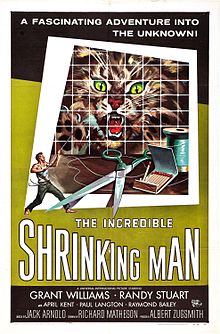Incredible Shrinking Man
| The Incredible Shrinking Man | |
|---|---|

|
|
| Directed by | Jack Arnold |
| Produced by | Albert Zugsmith |
| Screenplay by |
Richard Matheson Richard Alan Simmons (uncredited) |
| Based on |
The Shrinking Man by Richard Matheson |
| Starring |
Grant Williams Randy Stuart April Kent Paul Langton Billy Curtis |
| Narrated by | Grant Williams |
| Music by | Uncredited: Irving Getz Hans J. Salter Herman Stein |
| Cinematography | Ellis W. Carter |
| Edited by | Albrecht Joseph |
|
Production
company |
Universal Pictures
|
| Distributed by | Universal International |
|
Release date
|
|
|
Running time
|
81 minutes |
| Language | English/Swissgerman |
| Budget | $750,000 |
| Box office | $1.43 million (US) |
The Incredible Shrinking Man is a 1957 American black-and-white science fiction film from Universal-International, produced by Albert Zugsmith, directed by Jack Arnold, that stars Grant Williams and Randy Stuart. The film was adapted for the screen by Richard Matheson from his novel The Shrinking Man. The opening credits music theme (uncredited) is by Irving Gertz, with a trumpet solo performed by Ray Anthony.
The film won the first Hugo Award for Best Dramatic Presentation (at the time called "Outstanding Movie") presented by Solacon, the 16th World Science Fiction Convention in Los Angeles. By happenstance, Richard Matheson was the convention's that year. The film was named in 2009 to the National Film Registry by the Library of Congress for being "culturally, historically or aesthetically" significant.
Additionally, the cover variant to the third issue of IDW Comics' The Shrinking Man mini-series, adapted from Matheson's novel, includes "Incredible" in the comic's title as a direct reference to the film.
Robert Scott Carey (Grant Williams), known as "Scott," is a businessman who is on vacation with his wife Louise (Randy Stuart) on his brother Charlie's boat off the California coast. When Louise goes below deck for beer, a large, strange cloud on the horizon passes over the craft, leaving a reflective mist on Scott's bare skin. The couple are puzzled by the phenomenon, which disappears as quickly as it had shown up.
...
Wikipedia
